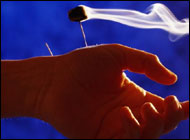Acupuncture in patients with osteoarthritis of the knee or hip
Osteoarthritis (OA) has a major impact on patients’ mobility and quality of life but the anti-inflammatory drugs used to treat it are associated with a number of side effects.
In recent years, patients have turned increasingly to acupuncture to relieve the chronic pain associated with OA. A new study published in the November 2006 issue of Arthritis & Rheumatism examined the use of acupuncture as an extension of routine medical care and whether the effects of treatment last after therapy is discontinued.
Led by Claudia M. Witt of the University Medical Center in Berlin, Germany, researchers conducted a randomized, controlled trial of a large number of patients with chronic pain due to OA of the knee or hip. Between July 2001 and July 2004, a total of 3,553 patients were divided into three groups: 322 immediately received up to 15 sessions of acupuncture in the initial three month period; 310 controls received no acupuncture for the first three months; and 2,921 (those who did not consent to randomization) received the same treatment as the acupuncture group. Each patient was followed for a total of six months and the control group received acupuncture during the last three months of their study period. The Western Ontario and McMaster Universities Osteoarthritis Index (WOMAC) and a health-related quality of life survey (Short Form 36) were used to measure outcomes when the study began and at three and six months.
“Patients with chronic pain due to OA of the knee or the hip who were treated with acupuncture in addition to routine care showed significant improvements in symptoms and quality of life compared with patients who received routine care alone,” the authors state. This was true for both the randomized and the non-randomized groups. Furthermore, patients in the control group who received acupuncture only after three months showed similar improvements at six months. In addition, WOMAC and SF-36 scores at six months were only slightly lower than at three months for those receiving acupuncture right away. 
Although the study was not a blind trial, its design was chosen to reflect general medical practice. It was one of the largest randomized trials of acupuncture to date and based in part on the results, the German Federal Committee of Physicians and Health Insurers is considering a proposal that acupuncture will be reimbursed by state health insurance funds. If approved, it will probably be provided as a routine medical option in treating OA.
The authors conclude that “the present results show that, in patients with chronic pain due to OA of the knee or hip who were receiving routine primary care, addition of acupuncture to the treatment regimen resulted in a clinically relevant and persistent benefit.”
In an accompanying editorial in the same issue, Tao Liu and Chen Liu of Jilin University, Changchun, Jilin, China, point out that acupuncture is part of traditional Chinese medicine, which views the body differently than biomedicine in that it emphasizes the body’s healing ability and aims for long-term healing, not necessarily a cure. In addition, acupuncture features close patient-provider relationships that involve enhanced interaction and communication, which can be beneficial in managing OA. They also suggest that in reality, few OA patients use acupuncture as the sole treatment and that a lack of information about how well it works has probably meant that acupuncture is an undervalued treatment option that could be an important element of a multidisciplinary approach to treating OA. The authors note that the current study “reflects as closely as possible the conditions of daily medical practice, and as the authors point out, maximizes external validity and clinical relevance.” They state that the study was limited in that the patient informed consent process was unclear and there were some patient characteristics that were not described, such as whether patients had previously tried acupuncture and what their experience was. They also maintain that an acupuncturist’s experience is the most important factor in treatment outcome. They conclude: “Given that the biologic mechanism of acupuncture is still unclear, the study by Witt et al furthers our understanding of acupuncture and adds to the accumulated evidence supporting its efficacy. Such evidence warrants extensive use of acupuncture in various chronic pain conditions.”
Revision date: July 6, 2011
Last revised: by Amalia K. Gagarina, M.S., R.D.